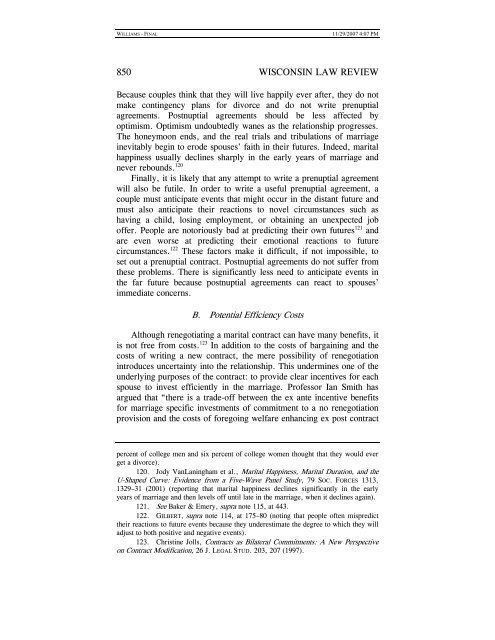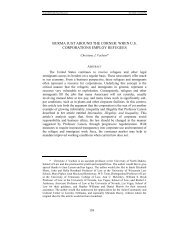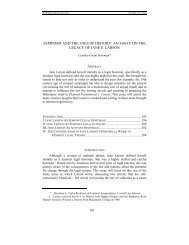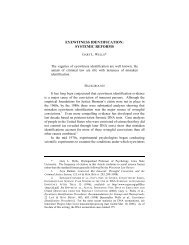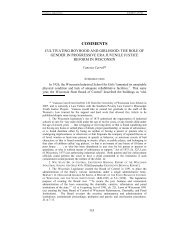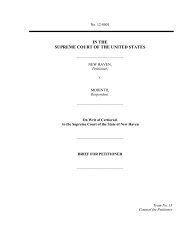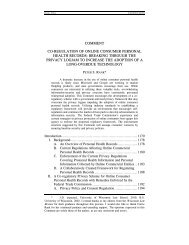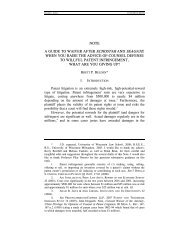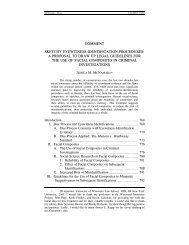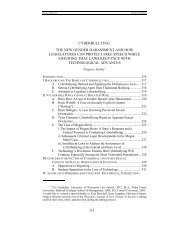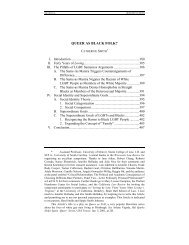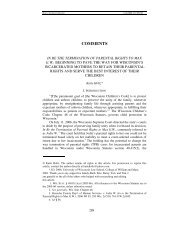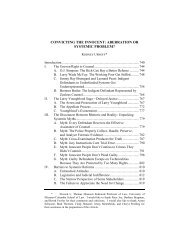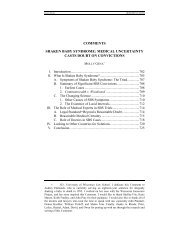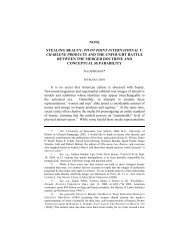POSTNUPTIAL AGREEMENTS - UW Law School
POSTNUPTIAL AGREEMENTS - UW Law School
POSTNUPTIAL AGREEMENTS - UW Law School
Create successful ePaper yourself
Turn your PDF publications into a flip-book with our unique Google optimized e-Paper software.
WILLIAMS - FINAL 11/29/2007 4:07 PM<br />
850 WISCONSIN LAW REVIEW<br />
Because couples think that they will live happily ever after, they do not<br />
make contingency plans for divorce and do not write prenuptial<br />
agreements. Postnuptial agreements should be less affected by<br />
optimism. Optimism undoubtedly wanes as the relationship progresses.<br />
The honeymoon ends, and the real trials and tribulations of marriage<br />
inevitably begin to erode spouses’ faith in their futures. Indeed, marital<br />
happiness usually declines sharply in the early years of marriage and<br />
never rebounds. 120<br />
Finally, it is likely that any attempt to write a prenuptial agreement<br />
will also be futile. In order to write a useful prenuptial agreement, a<br />
couple must anticipate events that might occur in the distant future and<br />
must also anticipate their reactions to novel circumstances such as<br />
having a child, losing employment, or obtaining an unexpected job<br />
offer. People are notoriously bad at predicting their own futures 121 and<br />
are even worse at predicting their emotional reactions to future<br />
circumstances. 122 These factors make it difficult, if not impossible, to<br />
set out a prenuptial contract. Postnuptial agreements do not suffer from<br />
these problems. There is significantly less need to anticipate events in<br />
the far future because postnuptial agreements can react to spouses’<br />
immediate concerns.<br />
B. Potential Efficiency Costs<br />
Although renegotiating a marital contract can have many benefits, it<br />
is not free from costs. 123 In addition to the costs of bargaining and the<br />
costs of writing a new contract, the mere possibility of renegotiation<br />
introduces uncertainty into the relationship. This undermines one of the<br />
underlying purposes of the contract: to provide clear incentives for each<br />
spouse to invest efficiently in the marriage. Professor Ian Smith has<br />
argued that “there is a trade-off between the ex ante incentive benefits<br />
for marriage specific investments of commitment to a no renegotiation<br />
provision and the costs of foregoing welfare enhancing ex post contract<br />
percent of college men and six percent of college women thought that they would ever<br />
get a divorce).<br />
120. Jody VanLaningham et al., Marital Happiness, Marital Duration, and the<br />
U-Shaped Curve: Evidence from a Five-Wave Panel Study, 79 SOC. FORCES 1313,<br />
1329–31 (2001) (reporting that marital happiness declines significantly in the early<br />
years of marriage and then levels off until late in the marriage, when it declines again).<br />
121. See Baker & Emery, supra note 115, at 443.<br />
122. GILBERT, supra note 114, at 175–80 (noting that people often mispredict<br />
their reactions to future events because they underestimate the degree to which they will<br />
adjust to both positive and negative events).<br />
123. Christine Jolls, Contracts as Bilateral Commitments: A New Perspective<br />
on Contract Modification, 26 J. LEGAL STUD. 203, 207 (1997).


